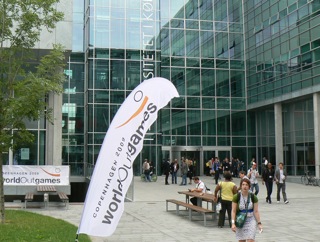 The World OutGames 2009 in July/August in Copenhagen was a huge sports event accompanied by conjoint international Human Rights Conference with the theme of ‘Love of Freedom – Freedom to Love’.
The World OutGames 2009 in July/August in Copenhagen was a huge sports event accompanied by conjoint international Human Rights Conference with the theme of ‘Love of Freedom – Freedom to Love’.
The Conference is an integral part of the Games that is mounted every four years. It took place during the first three days of the sporting events with over 500 delegates, presenters, speakers, guest diplomats and Danish officials focused on the human rights of LGBT people around the globe.
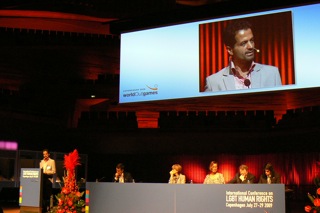
From as far away as Nepal, Brazil, Uganda, Iceland, Cuba and China, rights activists and organizers gathered at the stylish conference hall of the Danish Radio (DR) Corporation (photo above) to present their work and issues to a dedicated audience of concerned participants. (photo left, Sunil Pant, Nepal)
Copenhagen’s lord mayor, Ritt Bjerregaard, welcomed attendees at the opening day followed by plenary speeches delivered by well-known figures including Virginia Apuzzo, an activist and openly lesbian Bill Clinton aide, Thomas Hammerberg, Commissioner for Human Rights in the Council of Europe, Parvez Sharma, filmmaker, John Amaeche, an out NBA player now retired, Georgina Beyer, former transsexual MP from New Zealand, Kemone Brown, lesbian activist from Jamaica, Rasha Moumneh, researcher and advocate with Human Rights Watch, and others.
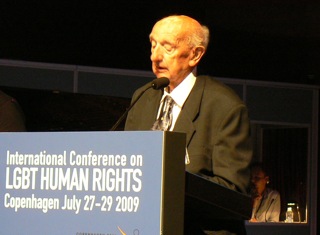
Inspiring Mentor
The star of the first morning, indeed the past half century was Axel Axgil (Denmark) now 95 years old (photo right) who spoke about starting the first LGBT group here in 1948 with his late partner, Eigil. They were the first couple in the world to legally and officially register their relationship (same as marriage except in name) in 1989 in Copenhagen. His personal history is the history of the modern LGBT human rights struggle for recognition and legitimacy. His words were soft but inspiring to hear, after which he received a long standing ovation and a bouquet of red roses.
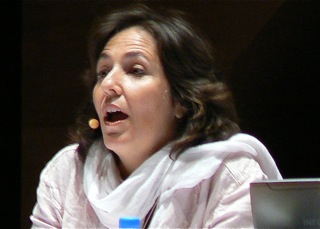
Perhaps the best known human rights activist was Mariella Castro (photo left) daughter of Raoul Castro, president of Cuba, who has modestly yet firmly used her influence to advocate and act for educational campaigns to sensitize Cuban society on gender and sexuality issues.
Themes and Purposes
The conference was divided into thematic topics: human rights, business, health, education, sport, family, sexuality and culture-and-media. In each of the workshop periods, two each day, over 20 different presentations were offered by participants from over 80 countries, totaling more than 120 offerings, revealing the complexity and breadth of the LGBT world today.
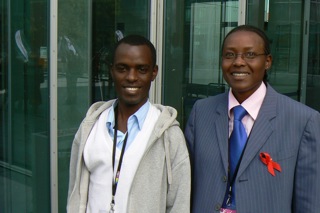
One of the most valuable purposes of the conference was to give ‘developing world’ activists a louder voice than they have at home, speaking to a supportive audience in tune with their crucial issues. The most poignant presentations were from the ‘global south’ in Africa, Asia and South America where LGBT rights work ranges at best from sporadic to, at worst, dangerous. (photo right, Frank and Pepe, Uganda activists)
Risking their own safety in countries such as Bolivia, Peru, Uganda, Zimbabwe, Iran or Turkey, these courageous men and women reported their efforts to bring human rights awareness to their governments, mainstream organizations, churches and law agencies—often with a minimum of success. Many of these activists have found it necessary (and safer) to mask their gay rights efforts under the cloak of health education, AIDS prevention or neighborhood charity work. (photo left, Rudy Aguino, Bolivia activist)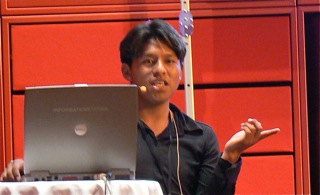
At the conference the ‘global north’ was able to unite in solidarity with the south in both principle and principal since much funding comes from Western Europe and North America. Not only does financial aid help sustain humanitarian efforts but it also gives lifeblood to the activists whose livelihood also depends on northern sponsorship.
However, as noted in one presentation there is unfortunately room for corruption in this field of work. When United Nations grants were announced for HIV prevention work directed at MSM (men who have sex with men) in Kenya, new ‘help’ groups suddenly appeared and applied for some of the grant money.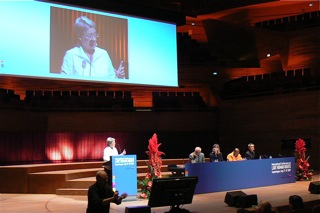
Of more importance was that Kenya has finally acknowledged that MSM exist and need to be targeted as a high-risk population for HIV prevention education.
(photo right, Paula Ettlebrick, USA human right leader)
Slowly African nations are reluctantly ‘coming out’ and recognizing that many men are not uniformly heterosexual, even married men, after insisting for a generations that homosexuality was a colonial or western import. MSM outreach was one of several key issues raised at the conference.
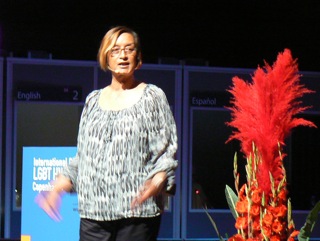
A second valuable purpose (among several) was the presence of the transsexual/transgender community who are, after much resistance from within the LGBT culture, entering mainstream discussions and raising their demands for rights, treatments and identity-change surgery urged by gender minorities leaders such as Georgina Beyer (photo left), New Zealand’s openly trans (former) parliament member and animated agitator for human rights.
Sober Conclusion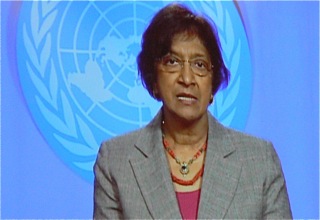
After three days of intense exchanges, busy networking, vegetarian lunches, films, musical interludes, all at DR’s well-equipped venue (staffed by helpful volunteers), the conference closed with poignant speeches by the Europe’s highest ranking human rights official—Thomas Hammerberg (Commissioner for Human Rights at the Council of Europe), Marcia Kran of the United Nations’ High Commission of Human Rights and Viti Muntarbhorn (Thailand) co-author of the Yogyakarta Human Rights Principles (“no discrimination, no criminalization, no violence” against sexual minorities).
A video was presented of Navi Pillay, the UN’s High Commissioner for Human Rights (photo right) who plainly said in her speech, “human rights are everyone’s rights. No exceptions.”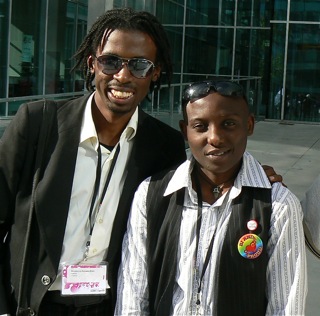
Laudable and purposeful as these words were from these esteemed people, at the very end the audience was reminded, by Victor Mukasa of Uganda and IGLHRC (photo left, with Nkoyooyo Brian also of Uganda on left) of the messy and daunting work in the ’trenches’ when he announced Uganda’s “ethics minister” is about to advance an “anti-gay bill” in parliament which would outlaw LGBT human rights activism by banning literature and public speaking on LGBT issues. It was a sobering end to a vilatlizing conference.
The conference also issued its major position paper called the ‘Copenhagen Catalogue of Good Practices‘. It was prepared for the Danish Institute for Human Rights, written and researched by Steven Jensen (Denmark) (photo right) under the leadership of Mandana Zarrehparvar (India). The catalogue seeks to ” help translate words into actions…by giving concrete examples of actions that have worked in other places to advance equality.”
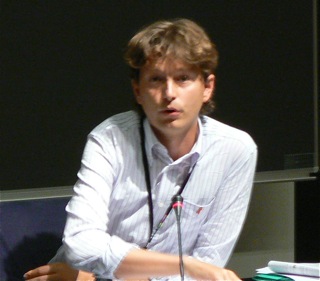
GlobalGayz was privileged to offer a presentation of its website under the theme of ‘Media and Culture’ as an example of how the Internet can be used to empower LGBT life through the medium of online information: Travel Resources, Archived Health-Political-Historical-Legal-Religious-Rights News and Reports, Photo Galleries and Charity Support.
(Also see another report on the conference.)
Also see Conference Reports:
Being lesbian, bi, trans woman in North Africa and in the Middle East
Report from MEEM organization in Lebanon
Book published by MEEM about Lebanese Lesbians
Speech made by Rasha Moumneth, Human Rights Watch
Also see:
Gay Denmark News and Reports
OutGames 2009 Report
Gay Denmark Life 2009
Outgames/Conference Photo Galleries
















